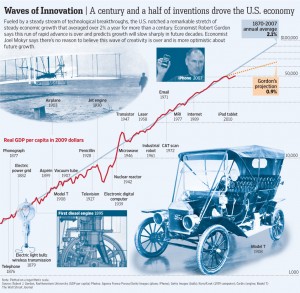Skip to content
This morning’s Wall Street Journal has a fascinating front page story (behind the pay wall) on the argument within economist circles as to whether or not technological progress has reached its zenith.
Proudly carrying the doomsday placard, Northwestern University’s Robert Gordon says technology drove the last century and half’s great progress, but that the game is up … that we will not see this kind of technology driven progress in the future, and thus will experience much lower growth.

(CLICK TO ENLARGE GRAPHIC)
Here is the nut of Gordon’s argument:
…The problem is that the biggest breakthroughs—like electrification or the discovery of antibiotics—are behind us. Electricity changed how people lived and worked, and it spawned hundreds of new industries. The technology that allowed people to communicate instantly or travel quickly over long distances were 19th- and 20th-century innovations.
More recent inventions—including the Internet—won’t pack the same punch, he said: “The rapid progress made over the past 250 years could well turn out to be a unique episode in human history.”
Cellphones, he said, are just a refinement of the telephone. “Look at what an ideal kitchen looked like in 1955—it’s not that different than today,” Mr. Gordon said. “It’s nothing like moving from clothes lines to clothes dryers.”
What do you think?
I don’t buy it! This is just another bundle of economic determinism peddled by an insular ivory tower. It assumes that all progress comes from the font of highly educated, lab coat types. It misses the point entirely.
Whether or not technological progress continues a pace is an interesting question but not as important as how human beings -the truly important economic actors- will react to, adopt, utilize, and optimize technologies.
I rather think the great challenge and opportunity of our age is democratizing the incredible wealth and economic assets that have been built over the last two centuries. The key to this is not necessarily more technological progress (though that will help), but rather increasing political and economic freedom.
Freedom enables the process of technology exploitation to work. It also engages a larger and increasing pool of innovators … who, more often than not, don’t don white lab coats.
Many more problems, many more solutions … Many more innovators, many more innovations!
Share This Story, Choose Your Platform!


[…] posted a week or so back about academics arguing about whether all the cool stuff has already been invented. The image above is a bookend I picked off a webinar I listened to today by Jim […]